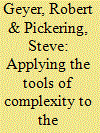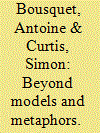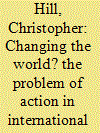|
|
|
Sort Order |
|
|
|
Items / Page
|
|
|
|
|
|
|
| Srl | Item |
| 1 |
ID:
104133


|
|
|
|
|
| Publication |
2011.
|
| Summary/Abstract |
Increasingly, complexity-based thinking is challenging the dominant rationalist, realist and reductionist international relations (IR) framework. However, to move this challenge beyond the academic realm and into the day-to-day world of policy, complexity thinkers must begin to develop useful tools for policy practitioners. This paper attempts to address this issue by demonstrating the weaknesses and limits of one traditional IR tool (X-Y graphic visualizations) and the strengths of complexity tools (the fitness landscape and range of complexity outcomes). To demonstrate these arguments we examine how fitness landscapes can be used to reinterpret traditional perspectives on development and conflict and make difficult problems more approachable through three-dimensional visualizations.
|
|
|
|
|
|
|
|
|
|
|
|
|
|
|
|
| 2 |
ID:
104136


|
|
|
|
|
| Publication |
2011.
|
| Summary/Abstract |
The concepts, language and methods of complexity theory have been slowly making their way into international relations (IR), as scholars explore their potential for extending our understanding of the dynamics of international politics. In this article we examine the progress made so far and map the existing debates within IR that are liable to being significantly reconfigured by the conceptual resources of complexity. We consider the various ontological, epistemological and methodological questions raised by complexity theory and its attendant worldview. The article concludes that, beyond metaphor and computational models, the greatest promise of complexity is a reinvigoration of systems thinking that eschews the flaws and limitations of previous instantiations of systems theory and offers an array of conceptual tools apposite to analysing international politics in the twenty-first century.
|
|
|
|
|
|
|
|
|
|
|
|
|
|
|
|
| 3 |
ID:
104140


|
|
|
|
|
| Publication |
2011.
|
| Summary/Abstract |
The issue of how to achieve change-in short of how to act-in a complex international system of 192 member states, without authoritative structures, or even a clear hierarchy of power, has been neglected in the literature of the academic subject of international relations. The focus has been predominantly on structures at the expense less of individual actors-much is written about the foreign policies of the major powers-than of the problem of agency itself. In terms of effecting significant change, how much is it reasonable to expect, and of whom? This lecture, which was given to mark the establishment of the new Department of Politics and International Studies at Cambridge, surveys the parameters of the problems of action, concluding that while states are still the most important site of agency at the international level the critical dilemma is now that of accepting and managing complexity and diversity. In particular the West must accept that its ability to provide leadership, unquestioned over the last two centuries, can no longer be assumed.
|
|
|
|
|
|
|
|
|
|
|
|
|
|
|
|
| 4 |
ID:
104134


|
|
|
|
|
| Publication |
2011.
|
| Summary/Abstract |
Foreign policy crises have traditionally been seen as turning points. Avoiding crises or, if they occur, resolving them has been a key objective of international politics. Historically, responses to crises have followed clear and predictable patterns: power centralizes around the leader of the executive, who, in turn, uses such power to formulate a seemingly unambiguous response that should lead to a clear end, the resolution of the crisis. This framework has been applied to events ranging from world wars to short-term events and is enshrined in many state constitutions, as well as built into national bureaucratic systems. It is based on order, reductionism, predictability and determinism. In this work, it will be argued that such responses are based on a misconception of what crises represent. It will be shown that crises represent complex adaptive systems. Political leaders should respond to crises by quickly decentralizing the policy process in order to enable a process of self-organization. Suggestions will be made on how this should be done.
|
|
|
|
|
|
|
|
|
|
|
|
|
|
|
|
| 5 |
ID:
104138


|
|
|
|
|
| Publication |
2011.
|
| Summary/Abstract |
Complexity has become an übernotion for a contemporary perception of many social phenomena. This is mirrored by the existence and advent of an array of methods and theories that describe complex social phenomena, including in International Relations (IR). However, many scholars fall short of explaining what it is they call 'complexity', how the notion of complexity can help to better understand IR and which kinds of methodologies support such analyses. This article provides an overview and critical discussion of the latter. The notion of complexity and its underlying concepts are briefly clarified and methodological aspects and challenges are discussed. It is explained which social phenomena within the realm of IR are most promisingly studied under a complexity paradigm. Three modelling examples are given for illustration that allow for the identification of methodological and epistemological limits and the anticipation of potential prospects of a complexity-based modelling approach to IR.
|
|
|
|
|
|
|
|
|
|
|
|
|
|
|
|
|
|
|
|
|